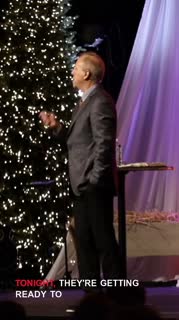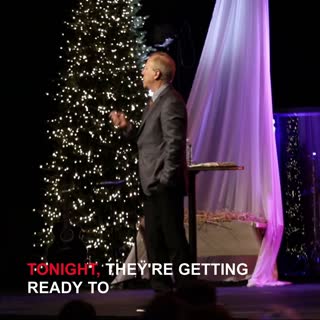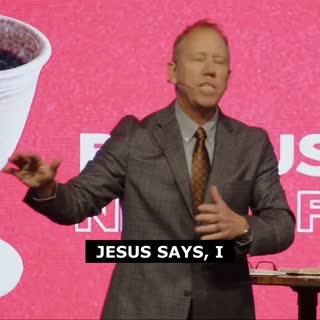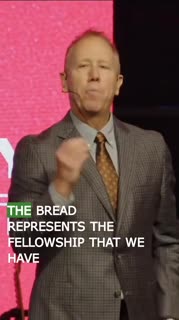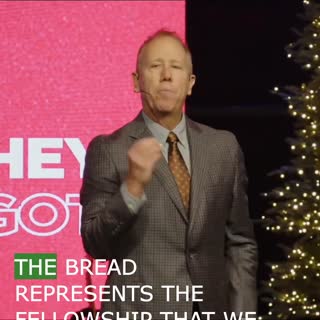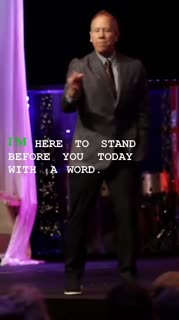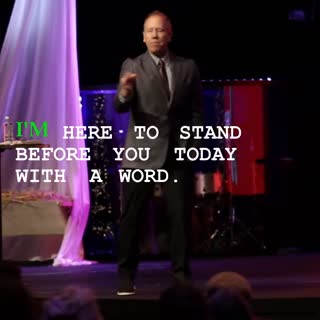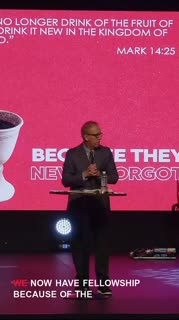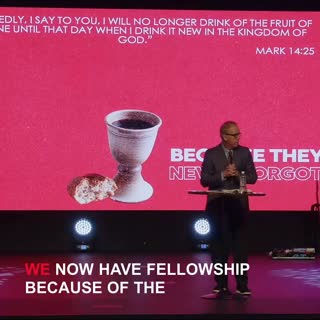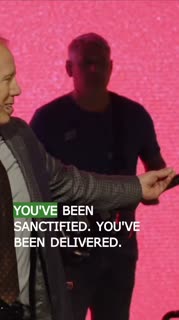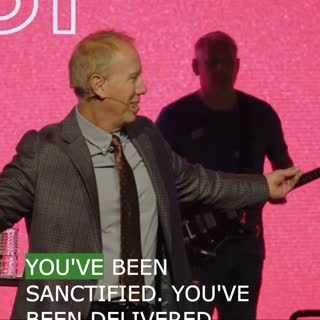Jesus: The New Covenant and Redemption Through Communion
Summary
In today's message, we explored the profound significance of the Passover meal that Jesus shared with His disciples, as recounted in Mark 14. This event, often referred to as the Last Supper, is a pivotal moment in Christian history, symbolizing the transition from the old covenant to the new covenant through Jesus Christ. The Passover meal was not just a remembrance of the Israelites' deliverance from Egyptian bondage but also a foreshadowing of the ultimate deliverance from sin and spiritual death through Jesus, the true Passover Lamb.
Jesus meticulously prepared for this meal, demonstrating His foreknowledge and divine orchestration. He instructed His disciples to follow a man carrying a pitcher of water, a rare sight, to find the place where they would celebrate the Passover. This preparation underscores that Jesus is not only a preparer but a pre-preparer, ensuring that everything was in place for this significant event.
During the meal, Jesus introduced a new meaning to the elements of bread and wine. The bread symbolized His body, given for the fellowship we have with Him, and the wine represented His blood, establishing a new covenant. This new covenant signifies that through Jesus' sacrifice, believers are sanctified, delivered, and redeemed. The disciples were reminded that spiritual death would pass over them, just as physical death passed over the Israelites' homes marked by the lamb's blood.
Judas Iscariot's betrayal was a stark contrast to the redemption offered to all. Despite his actions, the message is clear: no sin is beyond the redeeming power of Jesus. Judas believed the lie that he was beyond redemption, a belief that led to his downfall. In contrast, the other disciples embraced the truth of redemption, never forgetting who Jesus was and what He had done for them.
As we partake in communion, we remember that we have been sanctified, delivered, and redeemed. We look forward to the day when we will join Jesus in the marriage supper of the Lamb, celebrating the ultimate victory over sin and death.
Key Takeaways:
- Jesus is a pre-preparer, orchestrating events with divine precision. His preparation for the Passover meal demonstrates His foreknowledge and care for His disciples, reminding us that He is always working ahead of us to fulfill His purposes. [03:00]
- The Passover meal symbolizes the transition from the old covenant to the new covenant. Jesus redefined the elements of bread and wine, representing His body and blood, establishing a new covenant of redemption and eternal life. [15:08]
- Judas Iscariot's betrayal highlights the danger of believing the lie that one is beyond redemption. Despite his actions, the message is clear: no sin is too great for Jesus' redeeming power. [19:50]
- Communion is a reminder of our sanctification, deliverance, and redemption through Jesus. It is a celebration of the new covenant and a proclamation of our faith in His sacrifice and promise of eternal life. [28:26]
- The fourth cup, which Jesus did not drink, symbolizes the future gathering of believers in the marriage supper of the Lamb. It represents the ultimate victory over sin and the fulfillment of God's promise to gather His people. [34:52]
Youtube Chapters:
[00:00] - Welcome
[01:24] - Judas the Opportunist
[03:00] - Jesus' Divine Preparation
[10:00] - The Passover of Passovers
[11:12] - Redemption for All
[12:13] - The First Cup: Sanctification
[13:03] - The Second Cup: Deliverance
[15:08] - The New Covenant
[16:23] - Betrayal Foretold
[18:13] - Judas' Departure
[19:50] - The Third Cup: Redemption
[24:25] - The Lie of No Hope
[28:26] - Communion: A New Remembrance
[31:36] - The Fourth Cup: Future Promise
[34:52] - The Marriage Supper of the Lamb
[38:04] - Invitation to Redemption
[44:40] - Prayer of Redemption
Study Guide
Bible Study Discussion Guide
Bible Reading:
- Mark 14:10-26
- Exodus 12:1-14
- 1 Corinthians 11:23-26
---
Observation Questions:
1. In Mark 14:10-16, how did Jesus demonstrate His foreknowledge and preparation for the Passover meal? What specific instructions did He give to His disciples? [03:00]
2. What is the significance of the bread and wine during the Last Supper as described in Mark 14:22-24? How did Jesus redefine these elements? [15:08]
3. According to the sermon, what was the role of Judas Iscariot during the Last Supper, and how did his actions contrast with the message of redemption? [19:50]
4. What does the fourth cup, which Jesus did not drink, symbolize according to the sermon? How does it relate to the future gathering of believers? [34:52]
---
Interpretation Questions:
1. How does Jesus being a "pre-preparer" reflect His divine nature and care for His followers? What does this tell us about His role in our lives today? [03:00]
2. The sermon mentions that the Passover meal symbolizes a transition from the old covenant to the new covenant. How does this transition impact the understanding of redemption and eternal life for believers? [15:08]
3. Judas Iscariot believed he was beyond redemption. How does this belief contrast with the message of hope and redemption offered through Jesus? What can we learn from this about the nature of sin and forgiveness? [19:50]
4. The sermon describes communion as a reminder of sanctification, deliverance, and redemption. How does this understanding of communion influence the way believers should approach this practice? [28:26]
---
Application Questions:
1. Reflect on a time when you felt unprepared for a situation. How can the example of Jesus' preparation for the Passover meal inspire you to trust in His divine orchestration in your life? [03:00]
2. During communion, we remember Jesus' sacrifice. How can you make this remembrance more meaningful in your personal spiritual practice? What specific actions can you take to deepen your understanding of the new covenant? [28:26]
3. Judas believed he was beyond redemption. Are there areas in your life where you feel beyond forgiveness? How can you embrace the truth of Jesus' redeeming power in those areas? [19:50]
4. The sermon highlights the importance of never forgetting who Jesus is and what He has done. What practical steps can you take to keep this remembrance alive in your daily life? [28:26]
5. The fourth cup represents the future gathering of believers. How does this promise of future victory over sin and death influence your current faith journey? What can you do to live in anticipation of this promise? [34:52]
6. Consider the role of communion in your church community. How can you contribute to making this practice a more profound experience for others? What role can you play in helping others understand the significance of the new covenant? [28:26]
7. The sermon encourages believers to not believe the lie of no hope. How can you support someone in your life who might be struggling with feelings of hopelessness? What specific actions can you take to share the message of redemption with them? [24:25]
Devotional
Day 1: Divine Orchestration in Our Lives
Jesus' preparation for the Passover meal exemplifies His divine orchestration and foreknowledge. He instructed His disciples to follow a man carrying a pitcher of water, a rare sight, to find the place where they would celebrate the Passover. This meticulous preparation underscores that Jesus is not only a preparer but a pre-preparer, ensuring that everything was in place for this significant event. This act of preparation is a reminder that Jesus is always working ahead of us to fulfill His purposes. His care for His disciples reflects His care for us, orchestrating events in our lives with precision and love. [03:00]
Isaiah 46:10-11 (ESV): "Declaring the end from the beginning and from ancient times things not yet done, saying, ‘My counsel shall stand, and I will accomplish all my purpose,’ calling a bird of prey from the east, the man of my counsel from a far country. I have spoken, and I will bring it to pass; I have purposed, and I will do it."
Reflection: Think of a situation in your life where you see God's hand orchestrating events. How can you trust Him more in areas where you don't yet see His plan?
Day 2: The New Covenant of Redemption
The Passover meal symbolizes the transition from the old covenant to the new covenant. Jesus redefined the elements of bread and wine, representing His body and blood, establishing a new covenant of redemption and eternal life. This new covenant signifies that through Jesus' sacrifice, believers are sanctified, delivered, and redeemed. The disciples were reminded that spiritual death would pass over them, just as physical death passed over the Israelites' homes marked by the lamb's blood. This profound transformation invites believers to embrace the new life offered through Jesus. [15:08]
Hebrews 9:15 (ESV): "Therefore he is the mediator of a new covenant, so that those who are called may receive the promised eternal inheritance, since a death has occurred that redeems them from the transgressions committed under the first covenant."
Reflection: In what ways can you live out the reality of the new covenant in your daily life? How does this understanding of redemption change your perspective on your relationship with God?
Day 3: Redemption Beyond Betrayal
Judas Iscariot's betrayal highlights the danger of believing the lie that one is beyond redemption. Despite his actions, the message is clear: no sin is too great for Jesus' redeeming power. Judas believed the lie that he was beyond redemption, a belief that led to his downfall. In contrast, the other disciples embraced the truth of redemption, never forgetting who Jesus was and what He had done for them. This serves as a powerful reminder that redemption is available to all, regardless of past actions. [19:50]
1 John 1:9 (ESV): "If we confess our sins, he is faithful and just to forgive us our sins and to cleanse us from all unrighteousness."
Reflection: Is there a sin or failure in your life that you feel is beyond redemption? How can you bring this to Jesus today and trust in His power to forgive and restore?
Day 4: Communion as a Celebration of Faith
Communion is a reminder of our sanctification, deliverance, and redemption through Jesus. It is a celebration of the new covenant and a proclamation of our faith in His sacrifice and promise of eternal life. As believers partake in communion, they remember the profound significance of Jesus' sacrifice and the hope it brings. This act of remembrance is not just a ritual but a deep spiritual experience that connects believers to the heart of the Gospel. [28:26]
1 Corinthians 10:16-17 (ESV): "The cup of blessing that we bless, is it not a participation in the blood of Christ? The bread that we break, is it not a participation in the body of Christ? Because there is one bread, we who are many are one body, for we all partake of the one bread."
Reflection: How can you approach communion with a renewed sense of gratitude and reverence? What does it mean for you to participate in the body and blood of Christ?
Day 5: The Promise of Future Gathering
The fourth cup, which Jesus did not drink, symbolizes the future gathering of believers in the marriage supper of the Lamb. It represents the ultimate victory over sin and the fulfillment of God's promise to gather His people. This future promise is a source of hope and anticipation for believers, reminding them of the eternal joy and fellowship that awaits. It encourages believers to live with an eternal perspective, looking forward to the day when they will join Jesus in the ultimate celebration. [34:52]
Revelation 19:7-9 (ESV): "Let us rejoice and exult and give him the glory, for the marriage of the Lamb has come, and his Bride has made herself ready; it was granted her to clothe herself with fine linen, bright and pure”—for the fine linen is the righteous deeds of the saints. And the angel said to me, 'Write this: Blessed are those who are invited to the marriage supper of the Lamb.' And he said to me, 'These are the true words of God.'"
Reflection: How does the promise of the marriage supper of the Lamb influence your daily life and decisions? What steps can you take to live with an eternal perspective today?
Quotes
"Tonight, they're getting ready to celebrate the fact, and they don't even know it, that it's not physical death, that they're celebrating something that had happened 2,000 years ago, but they're going to celebrate the fact that not physical death, but something better, spiritual death is going to pass over them." [00:10:17] (21 seconds)
"They are going to leave and never forget from that day forward that the blood is more powerful than any sin that the enemy can tempt you with." [00:11:44] (10 seconds)
"Jesus says, I will sanctify you and I will deliver you. See, something's getting ready to happen on this Passover of Passovers. Jesus is getting ready to change two elements." [00:14:25] (12 seconds)
"The bread represents the fellowship that we have with the Lord. And any time we take of the meal and we take of the bread, we're reminded, we're remembered of the fellowship that we always have for him because he gave his body." [00:14:56] (16 seconds)
"I'm here to stand before you today with a word. You're never to the point to where you cannot take the third cup of redemption." [00:20:35] (10 seconds)
"We now have fellowship because of the body. We have an unbreakable covenant because of the blood." [00:30:09] (9 seconds)
"You've been sanctified. You've been delivered. You've been redeemed. So Jesus took, after eating that Passover meal, then He took the bread. As we're doing now, at least we never forget that this bread represents He is now. Our Passover lamb." [00:39:19] (27 seconds)
